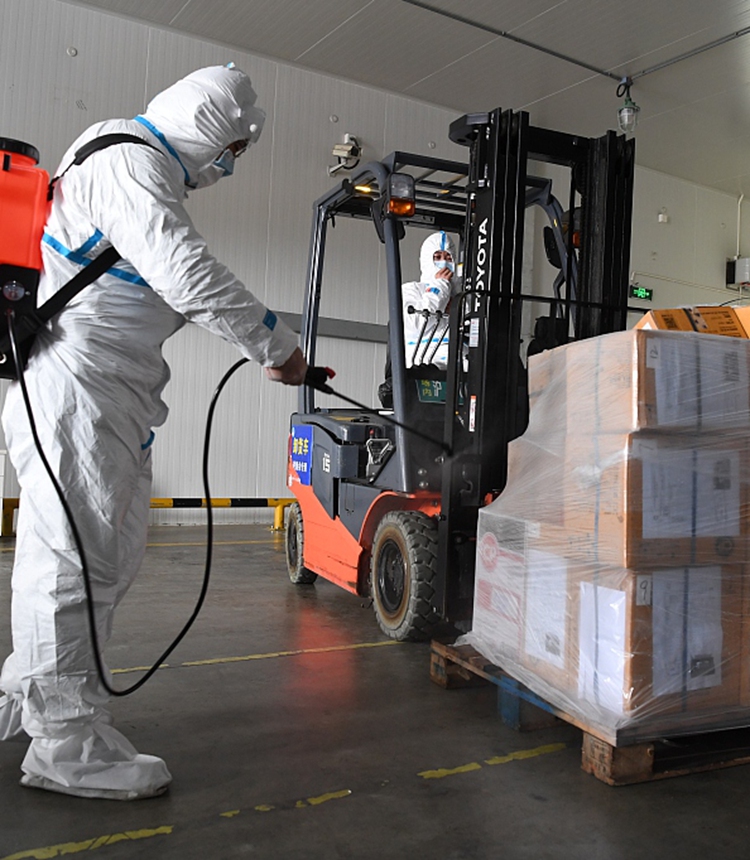Fears over supply chain from COVID-19 cases in imported Russian seafood
By GT staff reporters Source: Global Times Published: 2020/12/1 3:09:17

cold chain Photo:VCG
The rising number of coronavirus cases in cold chain imported aquatic products from Russia, China's largest source of aquatic imports, has cast a shadow of uncertainty over the seafood industry both domestically and globally, with industry insiders calling for further cooperation in cross-border cold chains in a bid to ensure smoother supply in the post-pandemic era.
Their remarks came after the outer packaging of frozen cod imported by Dalian Hongye Sea Products Co from Russia tested positive on Saturday. Closed-loop management and centralized medical observation have been carried out for those who were exposed to the cargo.
Just over a week ago, Chinese customs temporarily suspended imports from a Russian aquatic company after one package of frozen salmon tested positive.
The positive tests have caused concern among experts that the potential disruption of imports could affect the aquatic supply chains in China and the rest of the world.
Li Ziguo, director of the Institute of European and Asian Studies with the China Institute of International Studies, told the Global Times on Monday that he is concerned about the effect on the aquatic industry in China after the recent imported cases from countries including Russia, especially as the demand for various aquatic products in China will increase as the New Year approaches.
"Russia is a big exporter of seafood to China and it is hard to find a replacement. And there have been similar cases with other exporters from South America, so Chinese consumers may have to cut back on fish consumption," said Li.
For many years, Russia has been the largest seafood exporter to China, while the US ranks second. Last year, Russia exported more than a million tons of seafood to China, including cod, salmon, king crab and sea cucumbers, according to statistics from the China Aquatic Products Processing and Marketing Alliance (CAPPMA)
Although this year's figure has not been unveiled, due to the COVID-19 outbreak worldwide, the amount of seafood exported to China this year is definitely on the decline, with the impact expected to remain for some time, depending on the global prevention of the pandemic, experts said.
Some of the aquatic products consumed in China such as king crab are mostly from Russia, and if imports of such products are disrupted due to the pandemic, it will certainly have an impact on consumer prices in the domestic market, Cui He, president of CAPPMA, told the Global Times.
In addition, some of the seafood imported from Russia is reprocessed in factories in China before being exported to other countries, and if the imports of such products are affected, China's processing plants and the global industrial chain will also suffer, Cui said.
"If China wants to solve this problem, it must strengthen the cold chain cooperation with Russia and other countries from the source," noted Li.
Although the novel coronavirus cases in imported aquatic products are understandable as a common phenomenon in many countries, many of the Russian seafood exports to China come from bulk carriers, rather than fully sealed cold-chain containers, which adds certain risks, experts said.
Meanwhile, in responding to the rise in imported cases, Manzhouli, China's largest land port in North China's Inner Mongolia Autonomous Region, rolled out a second round of nucleic acid tests after detecting a virus strain similar to that in Russia. The port city has called for tighter restrictions on highway and railway ports along the Chinese border to curb risks brought by imported cases.
As the port city deals with the outbreak, it is also escalating its management and supervision over imported cold-chain products. Local market regulators were mobilized to examine local seafood markets, cold-chain warehouses and cold-chain vans.
Despite the potential disruption from the imported cases, traders have seen a limited impact on the supply chain so far.
Weng Qiang, a purchasing manager at Sunkfa Holding Group, a leading Beijing-based seafood company, told the Global Times that their live king crab imported from Russia via agents has not been affected so far.
"Checks on frozen goods from overseas have been tightened at several ports with customs inspection and quarantine to all countries having been strengthened," said Weng, noting that although the customs clearance time and disinfection work are in place, the supply chain is still smooth.
Experts said that more disinfection and testing of products needs to be done abroad at the export stage in a bid to further ease the concerns of domestic importers and boost consumer confidence.
Posted in: ASIA-PACIFIC,INDUSTRIES